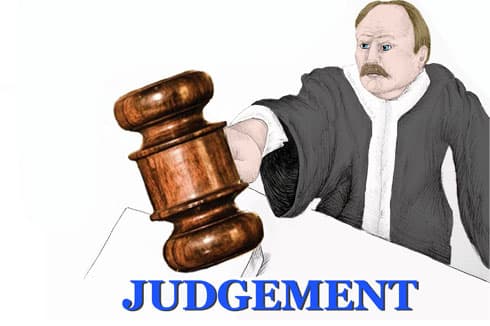Advice on Judgment Garnishment

Get rid of your debt faster with debt relief
Choose your debt amount
Or speak to a debt consultant 844-731-0836
- Review the ways a creditor can collect on a debt after receiving a judgment.
- Understand that how much a creditor can garnish varies from state to state.
- Consult with an attorney, to find out how a judgment will affect you.
- Start your FREE debt assessment
What will happen when judgment has been filed against you at the courthouse?
What will happen when a judgment has been filed against you at the courthouse for debts that you owe?
The answer to your question depends primarily on your state of residence, as each state regulates what actions judgment holders can to enforce judgments they have obtained. I will explain the details in just a moment.
Wage Garnishment
The most common method used by judgment creditors to enforce judgments is wage garnishment, in which a judgment creditor would contact your employer and require your employer to deduct a certain portion of your wages each pay period and send the money to the creditor.
Quick tip
If you have outstanding debts that you are struggling with, a quick first tip is to get a no-cost, no obligation analysis of your debt options from a pre-screened specialist, click here to see if you qualify: Free Debt Relief Quote.
However, several states, including Texas, Pennsylvania, North Carolina, and South Carolina, do not allow wage garnishment for the enforcement of most judgments. In several other states, such as New Hampshire, wage garnishment is not the "preferred" method of judgment enforcement because, while possible, it is a tedious and time consuming process for creditors. In most states, creditors are allowed to garnish wages between 10% and 25% of your income, with the percentage allowed being determined by each state.
For example, if you live in California, which allows for 25% wage garnishment, and you take home $2,000 per month, a judgment creditor could garnish you at the rate of $500 per month until the debt is paid off. Keep in mind that, generally, only one garnishment is allowed at a time, so if you have several judgments against you, the one who contacted your employer first would be paid first from the garnishment, then the second, and so on. Another important point to remember is that Social Security benefits, pension payments, and many other types of income for the elderly and disabled, are exempt from garnishment, which means that most elderly Americans do not need to fear wage garnishment if they are unable to pay their bills.
Quick tip #2
Concerned about what is appearing on your credit report now? Check your credit report today and get a free credit score instantly.
The US Dept. of Labor offers several resources explaining wage garnishment rules in general, and Title III, Consumer Credit Protection Act (CCPA), specifically.
Levy a Bank Account
Another option for a creditor trying to enforce a judgment is to request that your bank to place a levy on your bank account. Basically, this means that the creditor has the right to take whatever money in your account and apply the funds to the balance of the judgment. Again, the procedure for levying bank accounts, as well as what amount, if any, you can claim as exempt from the levy, is governed by state law. Many states exempt certain amounts and certain types of funds from bank levies, so you should carefully review your state's laws to find out if your bank account can be levied.
Lien
The third common way that creditors enforce judgments against consumers is by placing liens on properties owned by judgment debtors. For example, if you own a home, a creditor with a judgment against you will likely place a lien on your home, meaning that if you sell or refinance your home, you will be required to pay the judgment out of the proceeds of the sale or refinance. If the amount of the judgment is more than the amount of equity you have in your home, then the lien may prevent you from selling or refinancing until you can pay off the judgment.
Again, every state has its own rules about property liens, so if you have a judgment against you and own property, you should review your state’s laws to find out what your creditor can and cannot do to enforce its judgment.
To learn more about your state’s laws regarding the enforcement of judgments, I encourage you to visit the Bills.com State Consumer Protection Laws and Exemptions page.
If you have a judgment against you, consult with an attorney licensed in your state to learn how the judgment will affect you, based on your individual financial circumstances.
I hope this information helps you Find. Learn & Save.
Best,
Bill

Get rid of your debt faster with debt relief
Take the first step towards a debt-free life with personalized debt reduction strategies.
Choose your debt amount
Or speak to a debt consultant 844-731-0836
10 Comments
You almost certainly have a statute of limitations defense available to you. Consult with an Ohio lawyer should the lender file an action against you in Ohio, or a Georgia lawyer should the lender file an action in Georgia.
If you cannot afford a lawyer, contact Indiana Legal Services or another Indiana pro bono program for no-cost legal assistance.